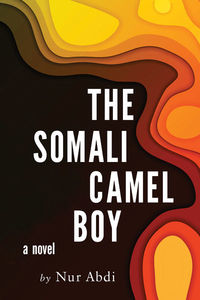"My Belief in Fate and Destiny Got the Best of Me" Read an Exclusive Excerpt from Nur Abdi's The Somali Camel Boy
Nur Abdi's debut novel The Somali Camel Boy (Mawenzi House) follows Ali, a young boy who has lost everything to a violent clan targeting his family. Tough and determined, he walks from his empty home to the capital city for a fresh start, but finds the ruling class there dominated by the same clan that took his future from him once already. When he is caught yawning - simply yawning - by one of the clansmen, he is arrested and imprisoned.
Years later, after the long and difficult process of escaping his homeland and starting a new life in Canada, Ali has just one goal: to get revenge on the clan that treated him so badly - in any way he can.
Epic and compelling, The Somali Camel Boy is a powerful story from a new voice in Canadian literature. We're excited to present an exclusive excerpt here today, from Ali's gruelling, adventurous journey to the capital city. In this section, he encounters a deadly threat.
This excerpt appears courtesy of Mawenzi House.
Excerpt from The Somali Camel Boy by Nur Abdi:
Late on a hot afternoon, I was walking through an inhospitable scrubland covered with termite mounds and scattered acacia trees. The desolation of the place had already set my nerves on edge. Not a sign of life anywhere. Not even a small bird overhead. Then suddenly, in this bleak terrain, I heard a low rumble—an ominous sound behind me that got closer and closer. I wondered what it could be. Was some killer stalking me? If so, would I be able to fight it off with my stick? Would I be able to outrun it? My pulse raced. My heart hammered in my chest.
Unable to see anything at first, I stopped again and looked behind. And there it was, the one I feared the most, the one all men dreaded to come face to face with in a deserted landscape. A lion with a thick grey mane was trailing me just a short distance away. Only a patch of dry bushes and a narrow stretch of empty space lay between us; but the lion had yet to see me—its head was down and close to the ground, sniffing my tracks.
In a moment it raised its head and we locked eyes over some bushes. Both the hunter and the hunted weighed their options, during which a blink of an eye felt like a year. The lion leaped in my direction. I lunged towards the closest acacia tree and quickly climbed up. My feet kept slipping and one of my shoes fell off, but I managed to clamber up.
By the time the lion caught up with me, I was out of its reach up in the tree. It looked up at me, its mouth wide open, its knife-like fangs in full display. A man-eating lion so close! Too old to climb the tree and come after me, it let out one big roar after another as it circled the tree, going round and round.
Noticing the shoe that I had dropped, the lion sank its teeth into it. After chewing the shoe for a while, it spat out a mouthful of wet mangled lump. One more time, the lion looked up at me. Then it sat down in the shade of the tree and waited, knowing well that I had nowhere to go and would come down sooner or later.
My older cousin, Omar, had warned me about this journey and the risks out there. He had pleaded with me not to go alone through the treacherous land between the camel country and the town, Hargis. “It is no place for a young, unarmed camel boy to venture into,” he said.
Your CanLit News
Subscribe to Open Book’s newsletter to get local book events, literary content, writing tips, and more in your inbox
I didn’t heed his advice and went on my way. I was in a hurry to go to town and nothing could dissuade me. My belief in fate and destiny got the best of me. And what a fate it turned out to be. I ended up crouching in the fork of two branches of a tree, a lion waiting for me on the ground. As if I hadn’t had enough tragedies in my life already.
I was two years old when my mother died soon after she gave birth to my younger sister Asha. My father didn’t live long either. Members of the Duki clan, our arch-enemies, had killed him in cold blood while he was out looking for a lost camel. They captured him and slaughtered him like they would an antelope. He didn’t have a chance with an enemy who would never let a Sudi clansman go free and see the sun again. When I was told of his death, I cried for a long time. Even the sky wept with a damp drizzle that continued throughout the day.
Not satisfied with the blood of my father, the Duki struck again. They came back to take away the only thing I had in the world, inherited from my father. They took my herd of camels in a raid that they carried out in broad daylight. With my parents dead and my herd of camels gone, my homeland had nothing for me but tragic memories. I decided to leave it for good and take my chances in Hargis, a town far away. I had nowhere else to go, and nowhere else to make a living.
Before I embarked on the journey, I bid farewell to Asha, who was thirteen years old, and the only other person left in my immediate family. She was living with our aunt at the time and I went to their place. Fearing that we might never see each other again, she cried copious tears. I walked away before I cried too, and set out on this fateful journey.
Down below, the lion stayed put in the shade of the tree. If only it would leave me alone and look for prey elsewhere! But what if it sat there throughout the day and the oncoming night? Could I remain perched in a tree like a bird? How long could I stay awake on top of a tree? I could fall asleep and tumble down to the ground.
In a desperate attempt to force the lion to go away, I started pestering it. I pissed on it. I threw pieces of bark, twigs, and my other shoe at it, sometimes hitting it. The lion merely shrugged them off and roared in response.
The sun inched its way towards the western horizon. The scariest and longest day of my life was coming to an end. The night could turn out to be worse. It loomed large and a sense of foreboding took over me. The thought of hanging on to a branch all night long put a chill in my spine.
Soon, the sun dipped over the horizon and a short dusk followed. A moonless night began to spread its dark wings on the land. I looked around for any light or fire out there, any sign of a nomadic camp in the area. Not the slightest glimmer of light anywhere. It felt as if all the people on the earth had perished and I was the only one left behind.
At the far eastern skies, just above the line where the earth and sky meet, a flicker of lightning caught my attention. A deep rumbling thunder followed. Big dark clouds appeared out of nowhere and quickly spread and engulfed most of the sky, while flashes of lightning lit the earth. The wind started to blow with an unrelenting force. The trees swayed from side to side.
To brace myself for the violent change in weather, I tightened my grip on two branches. No matter what, I had to avoid tumbling down into the jaws of a hungry lion. It was no way to die. I had to defy the odds and stay where I was. But how long could I keep holding on to a branch in the midst of a violent rainstorm? Only divine rescue could get me through this predicament, and I started praying.
Even the monster lion needed a divine rescue. Rattled by the rainstorm, it got restless and agitated. It moved from one side of the tree to the other and back again. Then abruptly it ran off, jumping over bushes along the way. I could hear its roars getting fainter and fainter in the distance.
For a moment, I wondered what had caused its sudden departure. Did it detect some other prey and go after it? Did it go to seek shelter from the storm? Or had it just lost patience with a camel boy up a tree? Whatever drove it away, my prayers had something to do with it. Not to lose any time, I climbed down in a hurry, picked up my stick and ran for my life. The lion could come back for all I knew!
As I rushed barefoot through the bushes, the rain splashed hard on my face. Some of the rainwater flowed into my mouth and gave relief to my dry throat and lips. The wind continued to gust as strong as ever and almost blew away my loincloth. More than once, I had to tighten it. Neither the rain nor the wind slowed me down. I kept on, sometimes running and sometimes walking. By the time the sun rose, the rain had stopped and the wind had died down, but there was still no sign of human presence anywhere.
A day later, I limped into the bustling streets of Hargis exhausted and desperate. For a young camel boy who had never seen a town before, what a scene! The white-walled buildings stretched as far as my bewildered eyes could see. Loud sounds reverberated from all directions. Waiters serving food and tea shouted their orders so loudly as if to announce to the whole world. Songs blared from every shop. Trucks roared along the roads, their horns louder than anything else.
In the streets, men walked in groups and exchanged heated arguments, while puffing on something that turned their breath into smoke. Young boys chased one another as they shouted their way through the crowds. Old men cursed them and shuffled along. The women strolled quietly down the street, dressed in long colourful blouses. Gracefully, they swung their hands back and forth, the aroma of incense trailing them.
A man who seemed in his twenties was selling broiled meat and steaming rice, handing out plates of the delicious-looking food to those who could pay for it. My eyes lingered on the food. My mouth salivated. My stomach growled. I had had nothing to eat for two days and wished I could get a piece of meat. But nothing was given for free in this town. Not even to a man dying of hunger. Only my clansmen could help me and I had to look for them and find them or I would starve to death.
_____________________________________________
Excerpt from The Somali Camel Boy by Nur Abdi, copyright 2019. Reproduced with permission of Mawenzi House.
Nur Abdi grew up in the territory now known as Somaliland. In the 1980s, when a civil war was raging in Somalia, he sought refuge in Canada and became a citizen in 1994. Opposing the repressive government ruling Somalia at the time, Abdi wrote articles in newspapers and magazines. He lives in Toronto. This is his first novel.





